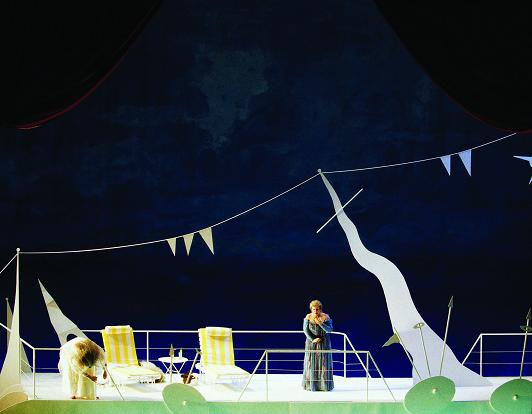When I saw Peter Konwitschny’s Tristan & Isolde at the Bavarian State Opera in
I have been searching for years to find a production that has quite the effect on me as the Munich Tristan and a few productions have gotten close: Konwitschny’s Dutchman—when well executed, David Fielding’s Ägyptische Helena, David Alden’s La Calisto, to name three that managed in the last few years.
Fortunately there is a DVD of the Munich Tristan with the above mentioned cast – conducted amiably by Zubin Mehta. But the chance to reexamine live what had left such an indelible impression on me then is better than any ‘canned’ experience might be able to provide – and I had that chance when a short run of four performances of that Tristan was given at the Staatsoper.
It is not only to Wagner’s popularity in this town that all four productions were sold out to the last seat, with throngs of ticket-seekers lingering around the opera house, but it also demonstrates the widely appreciated excellence and intelligence of Konwitschny’s Wagner productions. Additionally attractive was the allure of Waltraud Meier revisiting her supreme mezzo-Isolde – sharing the role with Linda Watson.
Catching the last of these four performances, I was scheduled to hear Watson – a prospect that promised a true soprano as Isolde, but also a singer who impresses me often and moves me rarely. As it turned out, Watson was who [most] people heard, anyway – as she jumped in for Mme. Meier
Be that as it may,
Michael Volle, a permanent member of the Staatsoper, easily makes any memory of Bernd Weikl fade: His Eugene Onegin was wonderful and he gave his all in Bernd Alois Zimmermann’s “Ecclesiastic Action” at the first Academy Concerto of the Bavarian State Orchestra. Now his Kurnewal was so superbly sung and acted that Tristan’s usually one-dimensional, emotionally limpid buddy threatened to become more interesting than John Treleaven’s main character. A fantastic performance that portrayed compassion and a genuineness that made Kurnewal surprisingly sympathetic.
The same must be said about René Pape’s König Marke. He is the undisputed successor to Kurt Moll and Hans Hotter in this repertoire. Perfect in diction and pronunciation, subtle, careful, and convincing in his acting, magisterial, round, and resonating over the entire range of his voice.
It would be unfair to say that John Treleaven’s Tristan disappointed: The singer was not just singing his fourth Tristan in just over a week, he had also gotten ill the day of this performance. But with no replacement at hand, he saved the show by singing right through, anyway. The result was of expectedly variable quality with moments that showed wear, swaths of struggle, and moving peaks. The effort alone was admirable and truly heroic.
The production, touched-up slightly from when I last saw it, makes the stage more intimate with its theatre-within-the-theatre setup. The briefest of summaries is: Ocean liner (Act I) – Flower-print couch (Act II) – Dilapidated room in castle with slide projector (Act III). Text and action are married to each other in the best of ways, the characters’ motivation always clear, and more than other productions, Konwitschny’s allows us to see Tristan and Isolde’s love not as induced by a potion but freed by casting off convention and fear when they both think that death is imminent.
The two white coffins that shine in spotlight over the last reverberating notes of the opera struck me as more tacky than I remembered. That the stage crew noisily swept broken glass from the floor behind a curtain in front of which Mme. Watson delivered a superb Liebestod was more than unfortunate. The ‘torch’ in Act II that Brangäne extinguishes looks as awful as ever. (And that in an opera house that admirably has no compunctions about using real torches, real glass, real water, and near-real explosions.) Tiny quibbles with what remains one of the very best opera productions I am familiar with.



Waltraud Meier actually did perform the entire first night (November 11th) of this Isolde in Munich and she was in excellent shape..Glad that I did not book for the 18th (since I must admit to being less than fond of Linda Watson, particularly after the less-than-impressive (to put it mildly) Brunnhilde I saw her perform in Bayreuth earlier this year).
ReplyDeleteI also felt that no performance had quite the effect on me that this Tristan had - that is, until I saw the Chéreau production in Milan two days ago. Completely breathtaking...